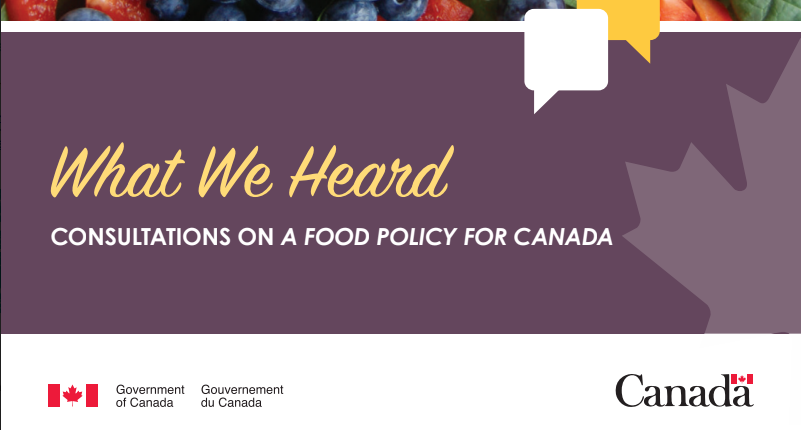Government Releases “What we heard” Report on Food Policy: What Does it Mean?

There is finally some noise about food policy as the government publishes its What We Heard report from its 2017 public consultations. This is not a policy document, it is a report back, but how the government frames what they heard, and where the volume is turned up, down or off, is significant, and gives us some indication of where they’re headed.
The food movement along with Indigenous Peoples have some wins to celebrate, such as the need to emphasize governance and reconciliation, environment and food security. But other concepts like the right to food and sustainable diets that are good for the planet and for people, fail to get traction. There are some troubling omissions - was there really no mention of fruits and vegetables or moving from meat to plant-based diets, or consideration of labour concerns?
 Overall, the report talks a lot about breaking down silos and recognising the linkages in our food system, but the follow-through in the report itself is patchy, perhaps inevitably at this stage of “listening”. It is encouraging that both the opening section on principles and the concluding section on new cross-cutting priorities to a great extent reflect approaches and mechanisms that the food movement has championed. However, there is no guarantee that they will be in the eventual policy, or determine hard choices and budgetary decisions.
Overall, the report talks a lot about breaking down silos and recognising the linkages in our food system, but the follow-through in the report itself is patchy, perhaps inevitably at this stage of “listening”. It is encouraging that both the opening section on principles and the concluding section on new cross-cutting priorities to a great extent reflect approaches and mechanisms that the food movement has championed. However, there is no guarantee that they will be in the eventual policy, or determine hard choices and budgetary decisions.
The four thematic chapters (renamed as Food Security, Health and Food Safety, Environment and Economic Growth) are still often wish lists of competing or contradictory policy ideas, and there is no indication yet of how difficult choices will be made. Yes, civil society advocacy has been relatively successful in framing and introducing key policy ideas, but there is much work still to be done.
Wins for the Food Movement and Indigenous Peoples
Instead of food “affordability”, the report recognises that food security is a better approach to making sure all Canadians can eat well and that’s a significant reframing of the theme. Addressing food security as an income and poverty issue gets attention, while the right to food and food sovereignty do not have the same traction. Other specific policy proposals championed by the food movement like school food, local and community-based solutions, local procurement for schools and hospitals, and the need for consistent data on food insecurity also got noticed.
The unique history and role of food for Indigenous peoples is repeatedly acknowledged, with recognition of food as a pathway to reconciliation, rights and land-based approaches, attention to the needs of remote communities and the need to protect and champion country and traditional foods. A distinctions-based approach is introduced as a new cross-cutting priority. Nutrition North is no longer heralded as the only solution for the crisis of northern food insecurity
A multi-stakeholder external advisory body is highlighted within a new cross-cutting governance priority. The National Food Policy Council proposed by FSC and others is specifically mentioned and this whole section draws heavily on language from that proposal.
“Environment” has replaced the more limiting thematic title of Conserving Our Soil Water and Air, which is both more straightforward and does not marginalize other important issues like biodiversity. There is valuable recognition of the need to protect agricultural land, champion new farmers, monitor the use of pesticides and reduce food waste, all of which are policies we championed.
In the growth theme there is welcome recognition of fostering local and regional (and organic) food markets, and a (rather weak) section on balancing economic growth with environmental and other priorities.
Disappointments and Disappearances
Adopting a rights-based approach as the anchor of Canada’s new food policy would be a gamechanger (leaving aside for now that Canada already has obligations through its international treaty commitments). Decoding the lukewarm inclusion of the right to food in this report, it seems that civil society has not yet won that argument..
The Health and Food Safety theme of the report is disappointing from a civil society perspective. While one cannot argue with reducing food fraud or improving food literacy, there is no real analysis of the connection between food and the health of people and the planet. The Healthy Eating Strategy and the role of government instruments like taxation and subsidies in changing the food environments faced by Canadian consumers are barely mentioned.
In terms of Environment there is a focus on the impact of climate change on food production but much less on the impact of agriculture on climate change. There is no acknowledgement whatsoever that a narrow trade agenda could make our food system less sustainable.
Given the momentum behind the growth target of $ 75 billion for agri-food exports by 2025, proposed by the Barton report and subsequently supported by new governmental bodies, instruments and budgets, it is no surprise that it headlines the Economic Growth section. This report hardly begins to address if or how this target could be achieved in ways that would be compatible with health, equity and respect for the Earth.
Finally, trade unions and others have drawn important attention to the role of labour in our food system (one in 8 jobs) including the use and abuse of migrant workers upon which we depend. This is, astoundingly, almost completely ignored.
Reaction from FSC members & others on the What We Heard report |
|
“If we ever want food policy to be carefully and holistically addressed by government, the creation of a body [such as a National Food Policy Council] that bridges ministers, departments and levels of government must be created. And such a body must include Indigenous voices alongside industry, academics and civil society.” - Evan Fraser, Director of the Arrell Food Institute at the University of Guelph in The National Post
“Food workers must serve a central role in the development and governance process if the National Food Policy is to be built on the feedback of Canadians. Actions on important issues like food safety will be less effective if the people who make and handle our food are excluded. They are the front lines and, if need be, the whistle-blowers in the food growing, harvesting, and manufacturing processes.” - Paul Meinema, National President, United Food and Commercial Workers Union (UFCW Canada) in a commentary
“A strong call for #IndigenousFoodSovereignty and #CommunityBased approaches to advancing food security in Canada was echoed loud and clear in the #FoodPolicy4Canada What We Heard Report. Kudos to @AAFC_Canada, @FoodSecureCAN and the many others who helped engage Canadians! ” As well as the recognition that #Food, #Culture, #Wellbeing, and #Reconciliation are inextricably linked! #FeelingHeard” - Arctic Institute of Community-Based Research on Twitter
“Environmental conservation should be Ottawa’s highest priority in the creation of a national food policy, according to a public survey conducted by the government. … Respondents listed a range of environmental issues of concern, including ensuring agricultural land preservation; the importance of biodiversity; and the relationship between climate change and agricultural production.” - Anne Hui, National Food Reporter, The Globe and Mail
“We need to agree on the common goal – to achieve a food system that is not only economically viable but also healthy, just and sustainable – across silos and sectors, such as government, civil society and the private sector. This requires recognizing that food is not simply a commodity but a central aspect of our social, cultural, historical and environmental realities, with a tremendous impact on the quality of our lives as citizens and as communities.” - Tia Loftsgard Executive Director of the Canada Organic Trade Association (COTA) in the Globe Content Studio.
“There’s growing awareness of the impact of our food systems on the environment and vice versa. Growing food at the expense of the environment doesn't work over time." - Martin Settle, Executive Director of USC Canada quoted in The Globe and Mail
“The What We Heard report captures the concerns of some respondents that a focus on affordability could undermine all of the other food policy themes. We share those concerns: affordable food is often ultra-processed; high in salt, sugar and saturated fat; and produced in ways that do not support farmers or our environment. Food produced with the environment and health in mind costs more. We strongly believe that we need to focus on making sure incomes and social supports allow all Canadians to participate in a better food economy.” Community Food Centres Canada in a news post
|
These are all issues we shall be discussing at our Assembly as we plan next steps.
|
As part of the consultation process, FSC submitted to the government an overarching Policy Brief. |
- Log in to post comments

